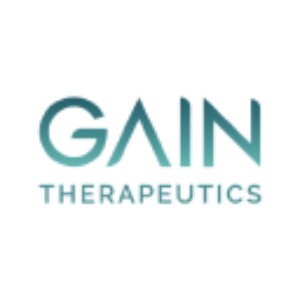Gain Therapeutics Announces Positive Topline Results from the Phase 1 Clinical Trial of GT-02287, a Novel GCase-Targeting Small Molecule Therapy for Parkinson’s Disease
Rhea-AI Summary
Gain Therapeutics (Nasdaq: GANX) has announced positive topline results from its Phase 1 clinical trial of GT-02287, a novel GCase-targeting small molecule therapy for Parkinson's disease. The study, which enrolled 72 healthy volunteers, demonstrated that GT-02287 was safe and well-tolerated at all dose levels, with no discontinuations or serious adverse events reported. Importantly, the drug showed presence in the cerebrospinal fluid and achieved peripheral target engagement.
Based on these promising results, Gain plans to initiate a Phase 1b trial in Parkinson's disease patients by Q4 2024, with data expected by mid-2025. The company aims to demonstrate safety, tolerability, and proof of mechanism through relevant biomarkers in this upcoming trial.
Positive
- GT-02287 demonstrated safety and tolerability in Phase 1 trial
- Drug showed presence in cerebrospinal fluid and achieved peripheral target engagement
- No discontinuations or serious adverse events reported in the study
- Phase 1b trial in Parkinson's disease patients planned for Q4 2024
- Potential to be a lead treatment for Parkinson's disease with or without GBA1 mutation
Negative
- None.
News Market Reaction
On the day this news was published, GANX declined 20.15%, reflecting a significant negative market reaction.
Data tracked by StockTitan Argus on the day of publication.
Results Include Safety, Tolerability, Pharmacokinetics, and Target Engagement
GT-02287, in Development for GBA1 Parkinson’s Disease, on Track to Initiate Phase 1b Trial in Patients in Q4 2024
BETHESDA, Md., Aug. 29, 2024 (GLOBE NEWSWIRE) -- Gain Therapeutics, Inc. (Nasdaq: GANX) (“Gain”, or the “Company”), a clinical-stage biotechnology company leading the discovery and development of the next generation of allosteric small molecule therapies, announces positive results from the Phase 1 study conducted to evaluate the safety, tolerability and pharmacokinetics of GT-02287. The Company previously announced that no discontinuations or serious adverse events were reported when the study concluded. The Phase 1 study enrolled 72 healthy volunteers, males and females, up to the age of 64 years. Review of unblinded data after database lock confirmed that single and multiple doses of GT-02287 were safe and generally well tolerated up to and including the highest planned dose levels across all age groups (approximately
“On the heels of this data, we expect to initiate a trial in people with Parkinson’s disease by Q4 2024 with the goal of demonstrating safety and tolerability in patients with Parkinson disease and to obtain proof of mechanism based on relevant biomarkers. We anticipate having data from Parkinson’s disease patients by mid-point 2025,” commented Jonas Hannestad, M.D., Ph.D., Chief Medical Officer of Gain.
Gene Mack, Interim CEO and current CFO of Gain, continued, “We are enthusiastic about the promising profile of GT-02287, particularly with the added observation of CNS exposure and target engagement. We’re proud to be executing on our near-term clinical milestones and look forward to presenting the full data and advancing GT-02287 further in the clinic with the goal of improving the lives of people with Parkinson’s disease.”
About GT-02287
Gain Therapeutics’ lead drug candidate, GT-02287, is in clinical development for the treatment of Parkinson’s disease with or without a GBA1 mutation. The orally administered, brain-penetrant small molecule is an allosteric protein modulator that restores the function of the lysosomal protein enzyme glucocerebrosidase (GCase) which becomes misfolded and impaired due to mutations in the GBA1 gene, the most common genetic abnormality associated with PD, or other age-related stress factors. In preclinical models of PD, GT-02287 restored GCase enzymatic function, reduced aggregated α-synuclein, neuroinflammation and neuronal death, increased dopamine levels and improved motor function and cognitive performance. Additionally, GT-02287 significantly reduced plasma neurofilament light chain (NfL) levels, an emerging biomarker for neurodegeneration.
Compelling preclinical data in mouse models of GBA1-PD, including that presented at FENS Forum 2024 in June describing improvement in cognitive performance in addition to motor performance after administration of GT-02287, suggests that GT-02287 may have the potential to slow the progression of Parkinson’s disease.
Gain’s lead program in Parkinson’s disease has been awarded funding support from The Michael J. Fox Foundation for Parkinson’s Research (MJFF) and The Silverstein Foundation for Parkinson’s with GBA, as well as from the Eurostars-2 joint program with co-funding from the European Union Horizon 2020 research and Innosuisse – Swiss Innovation Agency.
About Gain Therapeutics, Inc.
Gain Therapeutics, Inc. is a clinical-stage biotechnology company leading the discovery and development of next generation allosteric therapies. Gain’s lead drug candidate, GT-02287 for the treatment of Parkinson’s disease with or without a GBA1 mutation, is currently being evaluated in a Phase 1 clinical trial.
Leveraging AI-supported structural biology, proprietary algorithms, and supercomputer-powered physics-based models, the company’s Magellan™ drug discovery platform can identify novel allosteric binding sites on disease-implicated proteins, pinpointing pockets that cannot be found or drugged with current technologies. Its AI and machine-learning tools and virtual screening capabilities leverage the emerging on-demand compound libraries covering vast chemical spaces of over five trillion compounds to identify and select suitable small molecule hits for experimental validation.
Gain’s unique approach enables the discovery of novel, allosteric small molecule modulators that can restore or disrupt protein function. Deploying its highly advanced platform, Gain is accelerating drug discovery and unlocking novel disease-modifying treatments for untreatable or difficult-to-treat disorders including neurodegenerative diseases, rare genetic disorders and oncology.
Forward-Looking Statements
This release contains “forward-looking statements” made pursuant to the safe harbor provisions of the Private Securities Litigation Reform Act of 1995. These statements are typically preceded by words such as “believes,” “expects,” “anticipates,” “intends,” “will,” “may,” “should,” or similar expressions. These forward-looking statements reflect management’s current knowledge, assumptions, judgment and expectations regarding future performance or events. Although management believes that the expectations reflected in such statements are reasonable, they give no assurance that such expectations will prove to be correct or that those goals will be achieved, and you should be aware that actual results could differ materially from those contained in the forward-looking statements. Forward-looking statements are subject to a number of risks and uncertainties, including, but not limited to, risks associated with market conditions and the satisfaction of customary closing conditions related to the offering and uncertainties related to the offerings and the use of proceeds from the offerings. For a further description of the risks and uncertainties that could cause actual results to differ from those expressed in these forward-looking statements, as well as risks relating to the Company’s business in general, please refer to the Company’s prospectus supplement to be filed with the SEC, and the documents incorporated by reference therein, including the Company’s Form 10-K for the year ended December 31, 2023 and Form 10-Q for the quarter ended June 30, 2024.
All forward-looking statements are expressly qualified in their entirety by this cautionary notice. You are cautioned not to place undue reliance on any forward-looking statements, which speak only as of the date of this release. We have no obligation, and expressly disclaim any obligation, to update, revise or correct any of the forward-looking statements, whether as a result of new information, future events or otherwise.
Investor Contacts:
Apaar Jammu and Chuck Padala
ajammu@gaintherapeutics.com
chuck@lifesciadvisors.com
Media Contacts:
Russo Partners
Nic Johnson and Elio Ambrosio
nic.johnson@russopartnersllc.com
elio.ambrosio@russopartnersllc.com
(212) 845-4242








